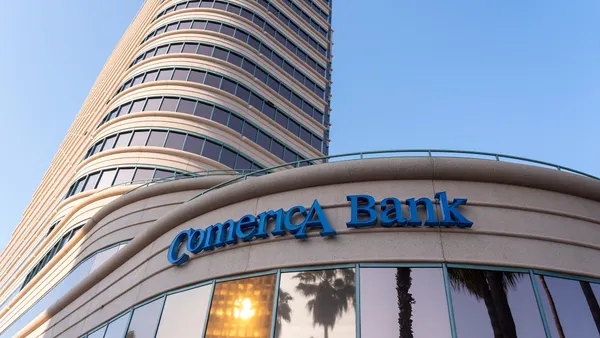Count First Horizon among the lenders seeking to seize an acquisition opportunity that might present itself, given the improved regulatory environment for banks to do deals.
As the Memphis, Tennessee-based bank – which analysts have speculated could be the next sizable acquisition target – reported third-quarter earnings results Wednesday, CEO Bryan Jordan said he’s “increasingly confident in our ability to integrate a well-structured merger with a strong cultural fit in our existing footprint, if such an opportunity arises in 2026 or beyond.”
Analysts covering the company jumped on the comments, with one noting Jordan’s remarks were “more pointed than in the past,” and another asking the CEO if his comments reflected that the bank was taking itself off the table as an acquisition target.

Jordan underscored that the landscape has changed “significantly” in recent quarters, with a new regulatory regime pursuing change and bank deal activity picking up.
“The regulatory environment, and particularly the bright line around $100 billion, or Category 4, in the total assets, seems to be a little less bright, and potentially can be moved up over time, and significantly easier to deal with,” Jordan said during the earnings call. He also noted banks are seeing faster deal approval timelines from regulators under the Trump administration.
The $83.2 billion-asset bank is focused on “fill-in” opportunities within its 12-state Southern footprint – particularly one that would have a strong deposit and customer base enabling First Horizon to cross-sell its offerings, Jordan said.
There “does appear to be more activity in terms of institutions thinking about what the future may look like, and as we look at our footprint, it is an opportunity to potentially gain a bigger foothold” in some markets, Jordan said.
Executives sought to stress that their mindset hasn’t changed, and the bank continues to push ahead on priorities designed to bolster the bank for the future and enhance growth, including delivering 15% or more in adjusted return on tangible common equity.
Still, maintaining investments in the bank and boosting profitability “not only keeps our optionality open, but it doesn’t take any off the table,” Jordan said.
He noted the bank was not for sale in early 2022, when Canadian lender TD offered to buy the bank, and “our board did the right thing in considering that alternative and the various alternatives, and the need to create maximum value for shareholders.” That $13.4 billion proposal was terminated in 2023 in part due to regulatory “uncertainty.” Regulatory scrutiny of TD’s anti-money laundering practices – which resulted in a historic $3 billion settlement – led to the deal being scrapped.
“What has changed is that there are smaller banks that are selling in our footprint,” First Horizon CFO Hope Dmuchowski emphasized during Wednesday’s call. “We have not changed our stance on optionality.”
Bank M&A activity has jumped this year and is expected to continue, given pressure on smaller lenders related to technology expenses and succession challenges, and regional banks seeing greater scale as essential to challenging the top U.S. lenders.
Last week’s announcement that Fifth Third plans to acquire Comerica for nearly $11 billion is the largest bank deal of 2025 thus far.
Investors’ mindsets have “shifted to assuming that any bank saying they’re open to M&A is going to try to do a deal,” Brian Finneran of Truist Securities wrote last week.












